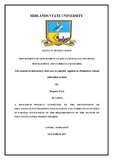Please use this identifier to cite or link to this item:
https://cris.library.msu.ac.zw//handle/11408/3587Full metadata record
| DC Field | Value | Language |
|---|---|---|
| dc.contributor.author | Magama, Trust | - |
| dc.date.accessioned | 2019-04-29T13:49:49Z | - |
| dc.date.available | 2019-04-29T13:49:49Z | - |
| dc.date.issued | 2017 | - |
| dc.identifier.uri | http://hdl.handle.net/11408/3587 | - |
| dc.description.abstract | The study explored the models of democracy that can be suitably applied to Zimbabwe school education system. This was driven by the fact that most African countries have not adopted proper models democracy in their institutions including schools. The study was also necessitated by the fact that democracy has historically proved to be closely to human flourishing. (Glaeser, Ponzetto & Shleifer, 2006; Halperin and Weinstein, 2005; Mangu, 2004; Pinar, 2003; and Carr, 2000). In light of the foregoing, the study argued that there are many models of democracy that can be suitably applied to Zimbabwe school education system. The theoretical analytical approach was used to critically analyze the issues under study. The study established that six models of democracy can be suitably applied to Zimbabwe school education system and these are classical democracy, direct democracy, indirect democracy, protective democracy, deliberative democracy and cosmopolitan democracy. The study, therefore, recommends that the government ensure that democracy is a chief ingredient in the education system. Various models of democracy ought to be embraced in the Zimbabwean education and be implemented in an integrated approach. There is also a need to have ubiquitous workshops with all the stakeholders in the education system on the importance of democracy in school. Learners must be allowed to have their freedom freely expressed in the schools without threats from the responsible authorities. There is need by the government and other organizations to enlighten learners in the schools so that they are empowered in regard to democracy. The study also recommends that any change in the education system ought to be a brain child of all the stakeholders and not a reform from above. There is also a need to jealously guard the freedoms, rights and opportunities of teachers, pupils and other stakeholders from infringement by the government. Deliberation ought to characterize the education institutions in the country and every learning must be characterized by critical thinking and rationality by all and finally any decision in the schools must be rendered valid after having voted for it and the majority endorsed it. | en_US |
| dc.language.iso | en | en_US |
| dc.publisher | Midlands State University | en_US |
| dc.subject | Democracy | en_US |
| dc.subject | School education system | en_US |
| dc.subject | Zimbabwe | en_US |
| dc.title | The models of democracy that can be suitably applied to Zimbabwe school education system | en_US |
| dc.type | Other | en_US |
| item.openairetype | Other | - |
| item.openairecristype | http://purl.org/coar/resource_type/c_18cf | - |
| item.fulltext | With Fulltext | - |
| item.languageiso639-1 | en | - |
| item.grantfulltext | open | - |
| item.cerifentitytype | Publications | - |
| Appears in Collections: | Master Of Education In Philosophy Degree | |
Files in This Item:
| File | Description | Size | Format | |
|---|---|---|---|---|
| Magama Masters Project 2017 Final.pdf | Full Text | 726.58 kB | Adobe PDF |  View/Open |
Page view(s)
100
checked on Apr 4, 2025
Download(s)
26
checked on Apr 4, 2025
Google ScholarTM
Check
Items in MSUIR are protected by copyright, with all rights reserved, unless otherwise indicated.



